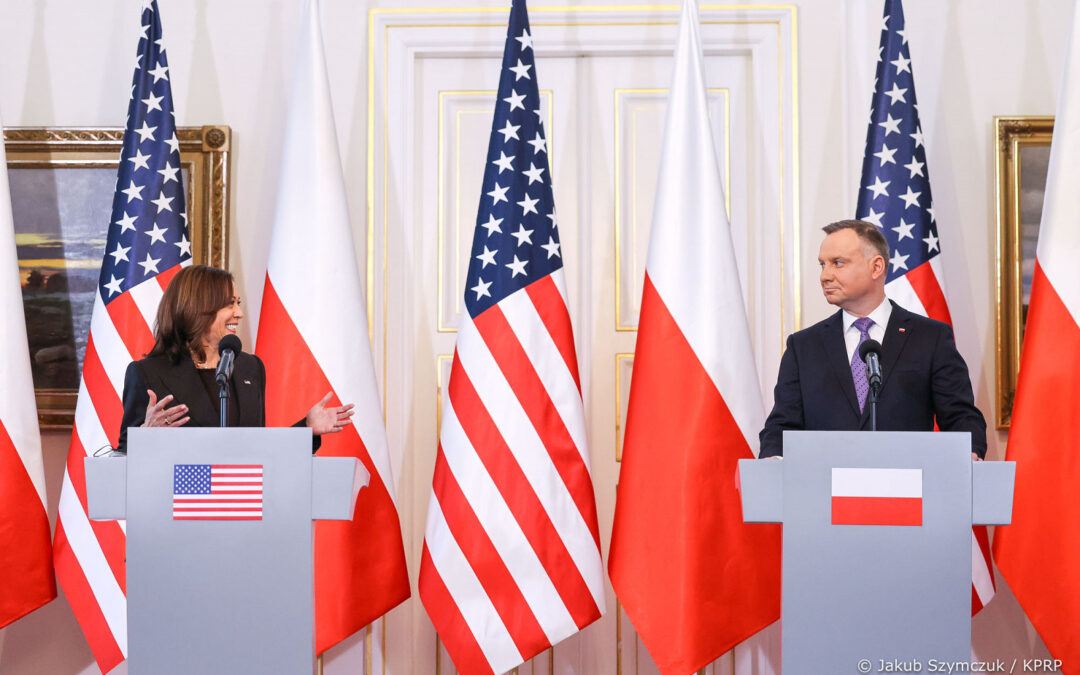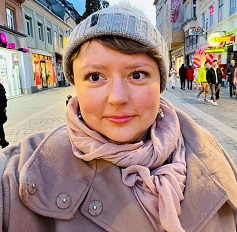By Joanna Kędzierska
Joe Biden will arrive Warsaw this Friday, with the US president due to discuss the security situation around Ukraine with Polish counterpart Andrzej Duda and reportedly set to praise Poland for its generosity in welcoming over two million refugees from the war.
His visit follows trips to Poland by Vice President Kamala Harris, Secretary of State Antony Blinken and Defence Secretary Lloyd J. Austin – all within the last month.
“I don’t know if there is any other country” to have received such a succession of the highest-ranking US officials, says Michał Baranowski, Warsaw office director of German Marshall Fund. “It shows how important Poland is as a kind of bridge to and from Ukraine.”
The @WhiteHouse has confirmed that President Biden will travel to Poland on Friday for talks with Polish counterpart @AndrzejDuda to discuss Russia's invasion of Ukraine and the "humanitarian and human rights crisis" it has caused https://t.co/x1cyPWsJov
— Notes from Poland 🇵🇱 (@notesfrompoland) March 21, 2022
This marks a significant change for a country that until recently had strained relations with many of its Western partners. The war in Ukraine has not only transformed approaches to Russia in the West; it has also prompted a realignment of relations with Poland.
Western partners have put aside previous issues of concern – such as the rule of law – to focus on the security and humanitarian situation in Poland, a frontline NATO country and the main destination for Ukrainian refugees. Meanwhile, the Polish ruling national populists have softened their previously hostile attitude towards the European Union, whose support – and money – is now needed more than ever.
Time will tell whether this is a temporary shift brought about by the exigencies of the war, or whether it marks the start of a genuine and durable shift.
Difficult relations with US, EU and Ukraine
Before the crisis in Ukraine, Poland’s Law and Justice (PiS) government had difficult relations with both the EU and the US, and also at times with Kyiv itself.
The main sources of conflict with Brussels concerned the rule of law. Poland has faced a series of legal actions against its judicial reforms, the most recent of which have resulted in daily fines of €1 million and the freezing of €36 billion in Covid recovery funds over Warsaw’s refusal to close a disciplinary chamber for judges.
PiS has in response argued that it is being deliberately and unfairly victimised by the EU for political reasons, and has sought to push back against Brussels alongside its ally Hungary.
In the case of Polish-US relations, PiS invested much political capital in building good personal ties with former President Donald Trump, who was seen as an ideological ally.
Those efforts were upended by the election of Joe Biden, who on the campaign trail had criticised the Polish government for its anti-LGBT campaign (which has also cost Poland EU funds) and mentioned Poland alongside Belarus and Hungary as countries where democracy was endangered.
As a result, “in the first year of Biden’s presidency, Polish-American relations were difficult”, says Baranowski.
It is also worth noting that before the war Poland did not always enjoy the warmest of relations with Ukraine either. Jan Piekło, who served as Polish ambassador to Ukraine from 2016 to 2019, notes that, before the current crisis, Prime Minister Mateusz Morawiecki had not visited Ukraine at all, and neither had his predecessor, Beata Szydło.
As Piekło explains, historical issues were the main factor here. “Russian intelligence did a lot to affect Polish-Ukrainian relations by reheating historical disagreements between the two states, aiming to lead to the point when Poland would not be able to talk to Ukraine at all,” he notes.
However, the former ambassador adds that relations were warm and productive at presidential level between Andrzej Duda and Volodymyr Zelensky.
Becoming an indispensable partner
The war in Ukraine immediately transformed many elements of the existing order, forcing a re-evaluation of priorities and relationships. Poland has become the main NATO frontline state and the most important hub for weapons and aid to be delivered to Ukraine.
The Polish government has also taken on the role of staunch advocate for Ukrainian interests in the West, lobbying for harsh sanctions against Russia and pushing for Ukraine’s EU membership. It has also opened its borders for Ukrainian refugees, who have been welcomed and supported by national and local authorities, civil society, businesses and individuals.
This has provided a huge image boost, notes Karolina Zbytniewska, editor-in-chief of EURACTIV Poland. “The perception of Poland in Europe is changing for the better. By welcoming Ukrainian refugees, Poles are washing away the bad impression their government made in 2015 and 2016,” when it rejected the relocation of Middle Eastern refugees.
"From here, the idea that Poland is an unwelcoming nation seems more than a little jarring…I glimpse a different narrative: a story of Poland not as a backslider from western values but a defender of them," writes @matthewsyed from the Ukrainian border https://t.co/4bJGzXUfSj
— Notes from Poland 🇵🇱 (@notesfrompoland) March 20, 2022
The war in Ukraine also prompted Polish authorities to go on a diplomatic offensive. The day after the invasion, Duda hosted a summit of the “Bucharest Nine” group of countries on NATO’s eastern front, with European Commission President Ursula von der Leyen also in attendance.
Duda and Morawiecki have hosted and visited an array of European leaders – including Recep Tayyip Erdoğan, Boris Johnson and Mark Rutte – over the last month, as well as welcoming Harris, Blinken and Austin to Warsaw.
The US vice president thanked Poland for its hospitality towards refugees and announced that the US would deploy two Patriot air defence batteries. That followed the transfer of thousands of additional US troops to Poland.
Britain's plans to deploy its new Sky Sabre advanced air defence system to Poland were first revealed last month, just before Russia's invasion of Ukraine https://t.co/yn5Zr4qZFm
— Notes from Poland 🇵🇱 (@notesfrompoland) March 17, 2022
“We see a completely new opening in bilateral relations,” says Baranowski. “On the US side, security issues have been decisive, while on the Polish side the change started from the vetoing of the so-called ‘media reform bill’.”
The latter is a reference to Duda’s decision in December to veto a law, passed by PiS, that would have threatened US ownership of one of Poland’s largest broadcasters. It is also a reminder that, though the Russian invasion has in many ways been transformative, there were already efforts underway by Duda to rebuild bridges with the West, including a proposal to abolish the judicial disciplinary chamber.
Last week’s dramatic visit to Kyiv by Morawiecki and PiS chairman Jarosław Kaczyński, together with the prime ministers of Slovenia and the Czech Republic, has also won international praise. It was “widely appreciated as an example of statesmanship and bravery”, says Zbytniewska.
The Polish, Czech and Slovenian PMs today visited Kyiv – the first foreign leaders to do so since Russia's invasion – where they met with @ZelenskyyUa.
Their aim was to show the "unequivocal support of the entire EU for the independence of Ukraine" https://t.co/FzeOQLSNeK
— Notes from Poland 🇵🇱 (@notesfrompoland) March 15, 2022
“I think that it was the right thing to do, and I wish more people would do it; I’d like to see Macron going next,” says Edward Lucas, a security specialist and columnist for The Times.
Lucas notes that the perception of Poland and its role abroad has changed. “I think people have understood that, despite all political disagreements with the government, when it comes to the war in Ukraine, Poland is an indispensable security partner and indispensable partner to cope with humanitarian catastrophe,” he says.
A temporary shift or long-term change?
Despite the current warming of relations between Poland and the West, there is no certainty as to how durable this détente may be. Poland still has no access to the EU resources from the Covid recovery fund; however, media reports suggest that it is possible the EU will soon decide to release the money, in particular to support Poland amid the massive influx of refugees.
“Issues concerning the rule of law have been sidelined when we are now facing the gravest security crisis of our generation, which will shape the world for years to come,” says Lucas.
The European Commission is preparing to release billions in recovery funds for Poland, which have been blocked over rule-of-law concerns, “within a matter of weeks”, sources tell the @guardian.
Similar reports have appeared this week in Polish mediahttps://t.co/BLYQM4uokC
— Notes from Poland 🇵🇱 (@notesfrompoland) March 17, 2022
Zbytniewska, however, argues that the EU should not unblock the money until the Polish government complies with European law.
“The EU should not turn a blind eye to it. This issue must proceed separately. As Poland is bearing the costs of the influx of refugees, the EU should grant special resources to deal with this humanitarian challenge, but it should not release the recovery fund money,” she says.
When it comes to Polish-US relations, Baranowski believes that we are, in fact, seeing a long-term trend. “I think the shift is as durable as geopolitical change in the CEE region. Poland has become a crucial ally for the US due to security issues and the US has become a vital partner of Poland for the same reason,” he says.
"In the face of the most pressing European security crisis since WWII, Poland has proven itself once again as a critical US ally by helping rally support for Ukraine and a rules-based international order," write @mikercarpenter and @USAmbPoland https://t.co/Q9ojES1VL6
— Notes from Poland 🇵🇱 (@notesfrompoland) March 21, 2022
Lucas agrees, noting that the war has changed the position of Poland on the global scene.
“Poland is absolutely the most frontline from all the frontline states so definitely it is in the centre of global affairs – not an object of international affairs, but a subject. It is no longer like a little brother of the United States, because it is making decisions independently, even if the rest of the world does not necessarily like them,” he says.
Main image credit: Jakub Szymczuk/KPRP





















